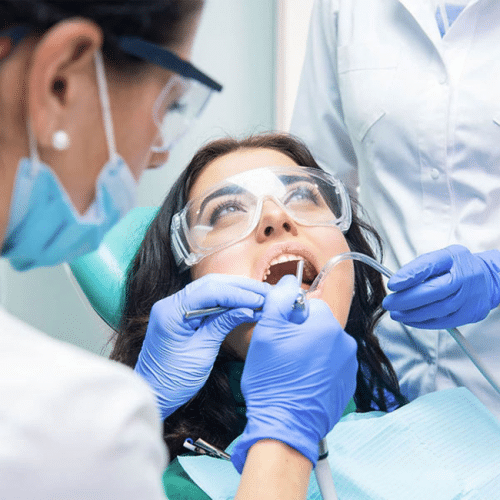Deep Cleanings with Local Anaesthetic in our South Dublin Clinic
Here at Smile Hub South Dublin Dental Clinic our skilled dentists and hygienists provide deep cleanings with local anaesthetic for patients who have signs of gum disease and high levels of plaque build-up. A deep cleaning with local anaesthetic may be recommended if you have gingivitis, bleeding gums, sensitivity gum recession, bad taste, bad breath, loose teeth and periodontitis (Gum Disease).
Dental Sedation is available at Smile Hub if you feel anxious/nervous about your deep cleaning treatment. Your dentist at Smile Hub is happy to explain the advantages of dental sedation along with the procedure and associated costs. Please ask any question you may have regarding dental sedation as we want you deep cleaning to be a pain-free and stress-free experience.
What is deep teeth cleaning?
A deep cleaning is a gum treatment that involves the removal of built-up plaque and tartar on the teeth and gums to prevent dental problems and to improve oral health. Plaque is a sticky film that stays on teeth after the intake or food and drinks. When plaque and saliva mix it creates bacteria which is harmful to the teeth and can cause cavities and other dental problems. Brushing and flossing your teeth can remove plaque but sometimes there can be areas left over which become an accumulation of hard deposits on the tooth above or below the gingival margin. If a patient has not had their teeth cleaned in a long time or has gum disease like gingivitis or periodontitis, they may need a deep cleaning to remove tartar above and below the level of the gums. A topical and/or local anaesthetic may be administered depending on the sensitivity of the area to be treated. The success of the treatment depends in part on your efforts to brush and floss daily, receive regular cleaning as directed, follow a healthy diet, avoid tobacco products and follow proper home care taught to you by this office.
Deep cleanings normally take place over 1-2 visits however more visits may be required depending on the extent of the tartar build up and intervals between your professional dental cleanings. Deep cleanings involve gum scaling and root planning with local anaesthetic.
The tooth scaling appointment is when the dentist or hygienist removes the plaque above and below the gumline. The root planing appointment, involves removing plaque that forms on the roots of your teeth. This helps reduce the size of the space between your teeth and gums, helping your gums reattach to the teeth. This tartar can result in gum recession, hypersensitivity, tooth mobility and tooth loss. Deep cleanings with local anaesthetic help to resolve your gingivitis or stabilise your Gum Disease. Regular 4-6 monthly cleanings are recommended to prevent re-occurrence of gingivitis and gum disease which may ultimately result in extreme sensitivity, pain, tooth mobility and tooth loss.



























